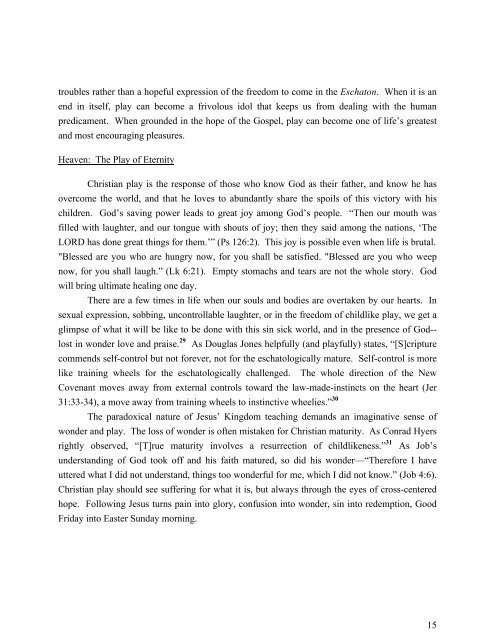Created to Play: Thoughts on Play, Sport, and the Christian Life
Created to Play: Thoughts on Play, Sport, and the Christian Life
Created to Play: Thoughts on Play, Sport, and the Christian Life
Create successful ePaper yourself
Turn your PDF publications into a flip-book with our unique Google optimized e-Paper software.
troubles ra<strong>the</strong>r than a hopeful expressi<strong>on</strong> of <strong>the</strong> freedom <str<strong>on</strong>g>to</str<strong>on</strong>g> come in <strong>the</strong> Escha<str<strong>on</strong>g>to</str<strong>on</strong>g>n. When it is an<br />
end in itself, play can become a frivolous idol that keeps us from dealing with <strong>the</strong> human<br />
predicament. When grounded in <strong>the</strong> hope of <strong>the</strong> Gospel, play can become <strong>on</strong>e of life’s greatest<br />
<strong>and</strong> most encouraging pleasures.<br />
Heaven: The <str<strong>on</strong>g>Play</str<strong>on</strong>g> of Eternity<br />
<strong>Christian</strong> play is <strong>the</strong> resp<strong>on</strong>se of those who know God as <strong>the</strong>ir fa<strong>the</strong>r, <strong>and</strong> know he has<br />
overcome <strong>the</strong> world, <strong>and</strong> that he loves <str<strong>on</strong>g>to</str<strong>on</strong>g> abundantly share <strong>the</strong> spoils of this vic<str<strong>on</strong>g>to</str<strong>on</strong>g>ry with his<br />
children. God’s saving power leads <str<strong>on</strong>g>to</str<strong>on</strong>g> great joy am<strong>on</strong>g God’s people. “Then our mouth was<br />
filled with laughter, <strong>and</strong> our <str<strong>on</strong>g>to</str<strong>on</strong>g>ngue with shouts of joy; <strong>the</strong>n <strong>the</strong>y said am<strong>on</strong>g <strong>the</strong> nati<strong>on</strong>s, ‘The<br />
LORD has d<strong>on</strong>e great things for <strong>the</strong>m.’” (Ps 126:2). This joy is possible even when life is brutal.<br />
"Blessed are you who are hungry now, for you shall be satisfied. "Blessed are you who weep<br />
now, for you shall laugh.” (Lk 6:21). Empty s<str<strong>on</strong>g>to</str<strong>on</strong>g>machs <strong>and</strong> tears are not <strong>the</strong> whole s<str<strong>on</strong>g>to</str<strong>on</strong>g>ry. God<br />
will bring ultimate healing <strong>on</strong>e day.<br />
There are a few times in life when our souls <strong>and</strong> bodies are overtaken by our hearts. In<br />
sexual expressi<strong>on</strong>, sobbing, unc<strong>on</strong>trollable laughter, or in <strong>the</strong> freedom of childlike play, we get a<br />
glimpse of what it will be like <str<strong>on</strong>g>to</str<strong>on</strong>g> be d<strong>on</strong>e with this sin sick world, <strong>and</strong> in <strong>the</strong> presence of God--<br />
lost in w<strong>on</strong>der love <strong>and</strong> praise. 29 As Douglas J<strong>on</strong>es helpfully (<strong>and</strong> playfully) states, “[S]cripture<br />
commends self-c<strong>on</strong>trol but not forever, not for <strong>the</strong> escha<str<strong>on</strong>g>to</str<strong>on</strong>g>logically mature. Self-c<strong>on</strong>trol is more<br />
like training wheels for <strong>the</strong> escha<str<strong>on</strong>g>to</str<strong>on</strong>g>logically challenged. The whole directi<strong>on</strong> of <strong>the</strong> New<br />
Covenant moves away from external c<strong>on</strong>trols <str<strong>on</strong>g>to</str<strong>on</strong>g>ward <strong>the</strong> law-made-instincts <strong>on</strong> <strong>the</strong> heart (Jer<br />
31:33-34), a move away from training wheels <str<strong>on</strong>g>to</str<strong>on</strong>g> instinctive wheelies.” 30<br />
The paradoxical nature of Jesus’ Kingdom teaching dem<strong>and</strong>s an imaginative sense of<br />
w<strong>on</strong>der <strong>and</strong> play. The loss of w<strong>on</strong>der is often mistaken for <strong>Christian</strong> maturity. As C<strong>on</strong>rad Hyers<br />
rightly observed, “[T]rue maturity involves a resurrecti<strong>on</strong> of childlikeness.” 31 As Job’s<br />
underst<strong>and</strong>ing of God <str<strong>on</strong>g>to</str<strong>on</strong>g>ok off <strong>and</strong> his faith matured, so did his w<strong>on</strong>der—“Therefore I have<br />
uttered what I did not underst<strong>and</strong>, things <str<strong>on</strong>g>to</str<strong>on</strong>g>o w<strong>on</strong>derful for me, which I did not know.” (Job 4:6).<br />
<strong>Christian</strong> play should see suffering for what it is, but always through <strong>the</strong> eyes of cross-centered<br />
hope. Following Jesus turns pain in<str<strong>on</strong>g>to</str<strong>on</strong>g> glory, c<strong>on</strong>fusi<strong>on</strong> in<str<strong>on</strong>g>to</str<strong>on</strong>g> w<strong>on</strong>der, sin in<str<strong>on</strong>g>to</str<strong>on</strong>g> redempti<strong>on</strong>, Good<br />
Friday in<str<strong>on</strong>g>to</str<strong>on</strong>g> Easter Sunday morning.<br />
15


